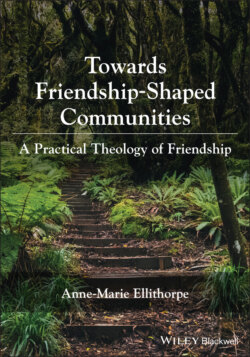Читать книгу Towards Friendship-Shaped Communities: A Practical Theology of Friendship - Anne-Marie Ellithorpe - Страница 30
Summary
ОглавлениеThis chapter has explored various themes and questions concerning friendship and its place in contemporary communities. Friendship has been recognized as a challenging word to define, yet as typically including reciprocity in affection as well as in willing good and doing good for the other.
Is friendship essential or peripheral to being human? Terrell argues that the human capacity to make friends is characteristic of our species; this befriending extends even to strangers. This befriending capacity is outworked within the context of varying cultural ideologies about relationships, gender, and friendship. Cultural ideologies are reproduced, reinforced, and reified through relational practices as well as through various forms of media.
Some consider friendship to be an endangered, marginalized relationship; others consider it to be more important than ever and a source of “social glue.” It is difficult to ascertain from the variety of social surveys undertaken whether Western people are in fact acquiring more differentiated, superficial friendships, or more life-affirming, soul friendships; respondents to surveys are rarely asked what they mean by friend. Various forms of technology, for those who can afford it, have the potential to sustain and deepen friendships, but can also function as a distraction from friendship. While social media and other technologies provide strategies for the maintenance of friendships, they must be used with discernment in order that the inherent dangers of use do not outweigh the benefits of use.
Cultural norms currently take precedence within the social imagination of many Christians. Nevertheless, there are clearly ethical, theological, and spiritual dimensions to friendship. While Anders Nygren discounted friendship as an ethical relationship, friendship has variously been depicted or described as integral to the overcoming of evil, sustaining service in the pursuit of the greater good, a corrective to a potentially egotistical life, the enduring element in all loves, a model for Christian love, and a model of the moral life. Friendship has been identified as a metaphor for God and an analogy for relationship with God. Christian friendship is a gift to be shared, is iconic, and can be cultivated as a spiritual discipline. While contemporary communities have privatized friendship, faith communities reverse this trend as they rediscover the public character of friendship.
Is friendship a private, public, or political relationship? While friendship has been regarded as a private relationship and a play form of sociability, friendship has been integral to struggles for social change and justice, and against various forms of oppression. Friendship is a goal of nonviolent resistance to oppression. While the terminology of love and friendship can and has been misused, friendship is identified as a potential model for citizenship and international relations. Friendship can contribute to decolonization; decolonizing friendship will allow for multiple ways of relating, being, and knowing. One hope for this project is that it contributes to the cultivation of friendships that will sustain such processes.
Whether regarded as an endangered relationship or an important source of social glue, friendship plays an invaluable role within twenty-first century communities, including communities of faith. While there has never been a golden age of friendship, there is much to be gained by developing a practical theology of friendship that demonstrates the social, ethical, political, and theological importance of friendship, bringing contemporary relational concerns into dialogue with relational traditions that have been obscured by modernity, including biblical, classical, and Indigenous traditions.
